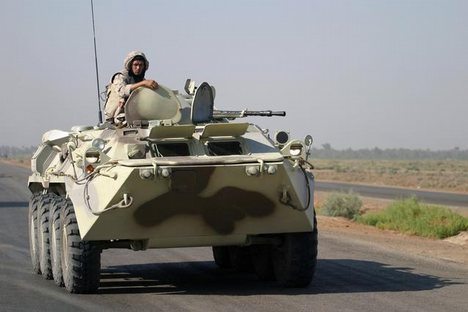The arms embargo on Libya agreed by the UN Security Council this weekend puts an official block on a flourishing trade for Russian and European defense contractors worth billions of euros (dollars).
Libyan leader Moamer Kadhafi’s international spending spree in recent years included fighter jets and military helicopters, but also assault rifles, pistols and explosives that charities warn could be used against protesters.
A Russian military source quoted by Interfax news agency on Sunday said Moscow had an order book for contracts from Libya worth 2.0 billion dollars (1.5 billion euros) and had been negotiating deals worth 1.8 billion more.
“Among the countries of the Middle East and North Africa, Libya is one of the main buyers of Russian weapons,” the source was quoted as saying.
Russian Defence Minister Anatoly Serdyukov confirmed Moscow was deeply troubled by the potential impact of the Arab revolts on its weapons exports.
“We are really alarmed by this. We would like contracts that were signed and arrangements to be implemented,” Serdyukov was quoted by Interfax as saying.
Moscow has been a traditional supplier for Libya since Soviet times but the lifting of a European Union arms embargo in 2004 opened up a new market also to European contractors, who rushed into the oil-rich North African state.
The most vocal backer of lifting the embargo was Italy, Libya’s former colonial ruler, which quickly became one of the top European arms suppliers to Tripoli.
The lobbying came from Prime Minister Silvio Berlusconi, who was then also the government leader and who later signed a friendship treaty between the two countries in 2008 that eased massive business deals in Italy and Libya.
“Even when everything is finished, there will be a page in the Libyan massacre that cannot be erased,” Italian daily La Repubblica said.
“The blood of the insurgents has been and will be spilt with European- and Russian-made weapons piled up by the regime in the last six years,” it added.
The UN estimates more than 1,000 people have been killed in recent clashes.
The latest official EU data for exports in 2009 show Italy at the top of the list with contracts worth 205 million euros, La Repubblica reported.
France was second with 143 million euros, followed by Malta with 80 million, Germany with 57 million, Britain with 53 million and Portugal with 21 million.
Network for Disarmament, an Italian non-governmental group, alleged that the shipment from Malta was in fact made up of Italian Beretta pistols and assault rifles from Italy and was only shipped through Malta to avoid detection.
“It’s… with these weapons that Kadhafi’s army is shooting the population,” Network for Disarmament and a second group called Table of Peace, said.
Among the shipments from Italy detailed by La Repubblica and Corriere della Sera are military helicopters, explosives and gun targeting equipment.
Corriere cited an interior ministry memo saying artillery firm Oto Melara was in talks to sell Libya “weapons or weapons systems with a calibre of more than 12.7 mm, as well as material, spare parts, know how and equipment.”
This year military shipmaker Intermarine Spa also started negotiations with Libya for contracts worth a total of 600 million euros, the newspaper reported.
Arms sales to Libya already created an uproar in Belgium last week.
The regional government of Wallonia was condemned by human rights groups for granting an export licence for the sale of assault rifles, submachine guns, grenades, and handguns to Libya in 2009 for a value of 6.9 million euros.










